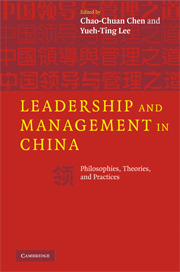Book contents
- Frontmatter
- Contents
- List of figures
- List of tables
- List of contributors
- Preface
- Acknowledgments
- Introduction: The diversity and dynamism of Chinese philosophies on leadership
- Part I The Confucian foundations
- Part II Alternative traditional Chinese leadership philosophies
- Part III Modern Chinese leadership theories and practices
- 6 Paternalistic leadership in Chinese organizations: research progress and future research directions
- 7 The leadership theories and practices of Mao Zedong and Deng Xiaoping
- 8 Chinese traditions and Western theories: influences on business leaders in China
- 9 Linking Chinese leadership theory and practice to the world: leadership secrets of the Middle Kingdom
- Index
- References
8 - Chinese traditions and Western theories: influences on business leaders in China
Published online by Cambridge University Press: 14 May 2010
- Frontmatter
- Contents
- List of figures
- List of tables
- List of contributors
- Preface
- Acknowledgments
- Introduction: The diversity and dynamism of Chinese philosophies on leadership
- Part I The Confucian foundations
- Part II Alternative traditional Chinese leadership philosophies
- Part III Modern Chinese leadership theories and practices
- 6 Paternalistic leadership in Chinese organizations: research progress and future research directions
- 7 The leadership theories and practices of Mao Zedong and Deng Xiaoping
- 8 Chinese traditions and Western theories: influences on business leaders in China
- 9 Linking Chinese leadership theory and practice to the world: leadership secrets of the Middle Kingdom
- Index
- References
Summary
This chapter concerns contemporary Chinese business leaders' management philosophies and the sources of these philosophies. Semi-structured interviews were conducted with thirty-five successful business leaders from enterprises in China. Content-analyzing the interviews, we identified seven management philosophies held by these business leaders: sincerity is essential; pursuit of excellence; social responsibility; harmony is precious; the Golden Mean (acting in the middle way); specialization; and scientific management. We found that both Chinese cultural traditions and Western management theories influence Chinese business leaders' management philosophies and practices. While the Western management theories have great impact on their task-related operations, Chinese culture has a significant influence on their people management practices. These findings suggest that modern business administration education should balance Western theories and Chinese philosophies and integrate the wisdoms from the two streams.
Inroduction
The term “management philosophy” has appeared frequently in Chinese popular mass media and Chinese business leaders' speeches. In a database named Chinainfobank, we searched for articles containing “guan li zhe xue [management philosophy]” in newspapers in China. We found 44 articles published in the period 1990–1999, 198 in 2000–2002, and 165 in 2003–2005. Then we searched for “guan li li nian [management ideas]” in the same database and found a huge number of articles: 164 published in 1990–1999, 2595 in 2000–2002, and 4904 in 2003–2005.
- Type
- Chapter
- Information
- Leadership and Management in ChinaPhilosophies, Theories, and Practices, pp. 239 - 271Publisher: Cambridge University PressPrint publication year: 2008
References
- 16
- Cited by



